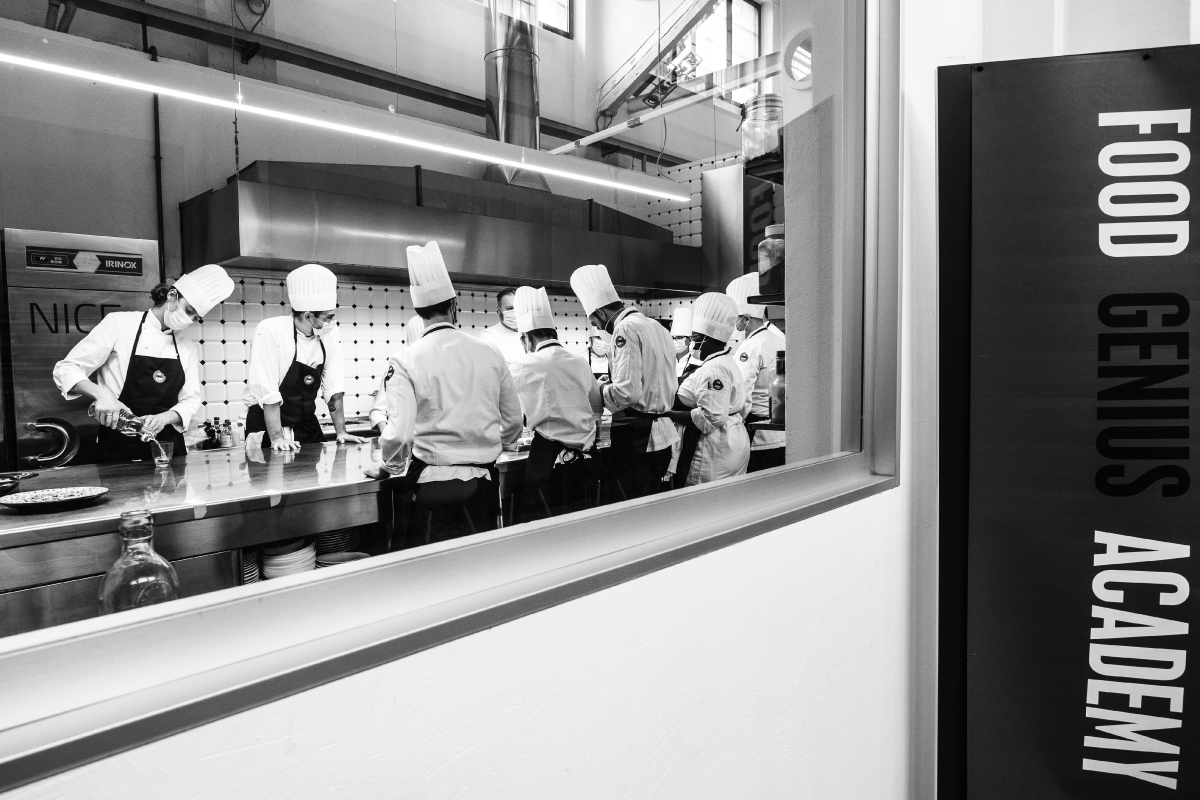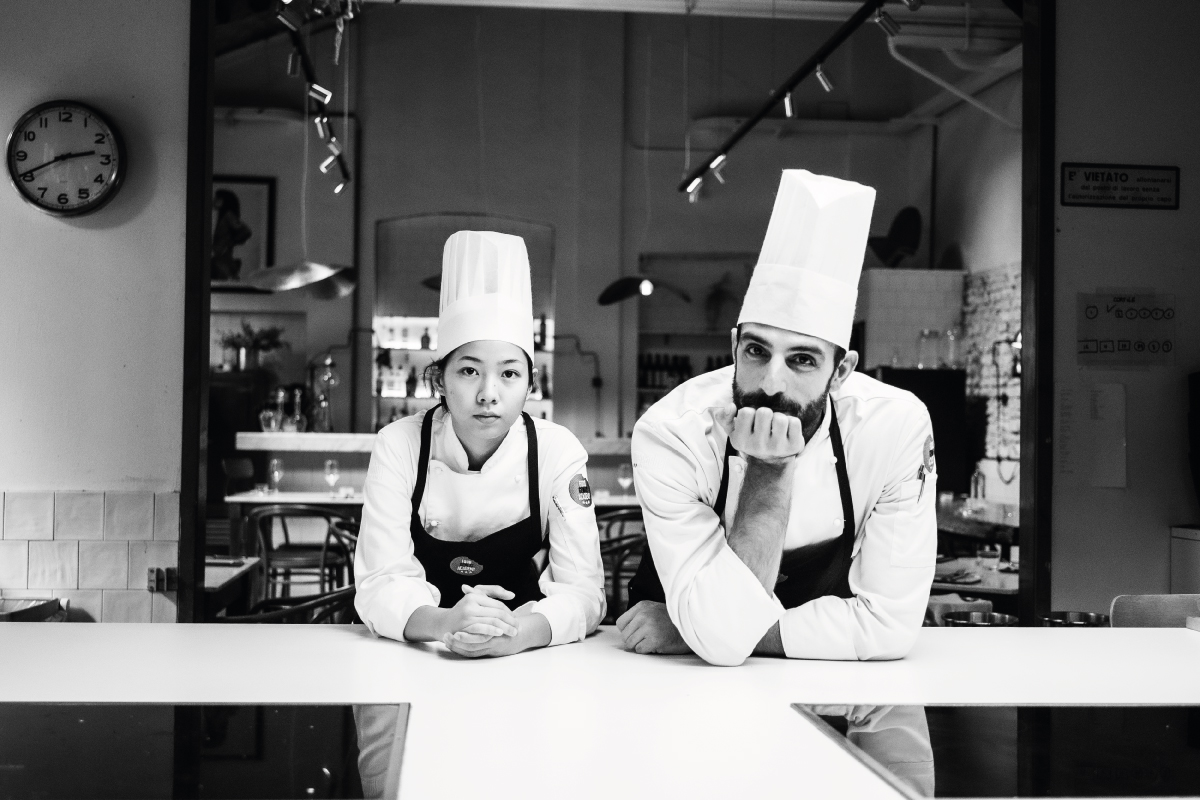Our values
We love a cuisine that has its roots in tradition but isn’t impaired by it, a cooking technique with varied ingredients, different ideas and people from all around.
You’ll be learning to make the most classic tortellini and the day after amazing Sichuan’s sauces, and cutting edge nordic fermentations.
We crave a sustainable industry. We separate ourselves from the brigade mentality of hazing the young ones, we also separate ourselves from the heroic, interminably useless, sixteen hour shifts.
These techniques are obsolete, unfair, and have very little to do with good service. We believe it to be the best job in the world, and we want to make it so for everybody.
We want to teach techniques that favour flavour, we want you to know the most classical French sauces as well as the most avant guard techniques. We don’t want you to do a molecular spherification for the sake of the technique itself, or decorate every single dish with chocolate and berries.
We promote zero waste culture. We don’t throw away anything mainly as an ethical choice, but also clearly as an economical one. Here at FGA, the produce is transformed from nose to tail. This conscientious choice is made within every lesson, whether the focus is on fish or carrots, it doesn’t make a difference.
Culture feeds us, that is why theoretical lessons are as important as practical ones. A pastry chef or a Commis that ignore certain aspects of our industry and our world, are not to be considered well rounded professionals in our minds.
Discipline, rigour and excellence: we believe in the power of authority, respect and knowledge, in work ethic and team spirit. And in that pinch of genius within us all.

Our method
FGA offers an intensive study program with practical and theoretical notions, it also teaches you skills you’ll bring with you in the job market, gives you a 360 degrees view on FnB and an amazing networking opportunities.
We are the only food academy with its own restaurant. So you won’t have to wait to be thrown in the midst of service.
Our professional Haute Cuisine and Pastry curriculum starts off in kitchen labs where pupils are followed closely and learn with the chefs and pastry chefs; Then there are theoretical classes as well, followed by an internship in actual restaurants and patisseries. It’s a step by step program, that we have melted with pedagogue John Dewey’s vision which consists mainly in learning by doing – but applied to our industry. We are proud to say that this different approach to teaching has been emulated by other professional academies in Italy.
Referred pedagogy
Learning by doing means integrating our core notions into lab practices. Here we don’t study produce on paper, we actually get to smell them, touch them, cut them up with our knives and cook them – then we receive other necessities to strengthen our theoretical knowledge. We do home work in school and extra work at home, we use a technique called referred pedagogy that focuses the hours spent at the academy on practical knowledge, we don’t just throw slides and charts at students to be passively and boringly absorbed.
We do much more as well, we’re the only academy with a real running restaurant, real events and paid catering where our students can learn what it really means to work in a kitchen or on the floor, managing and dealing with real life costumers.
To learn a job, it is necessary to break a sweat, and here you get to do that straight away: while studying, learning to optimise the time you have and while being taught by professionals, and, at the same time amplifying the opportunities to gain experience points well before starting the actual internship.
Have you ever seen an individual partie in a professional kitchen?
We don’t overcrowd our classrooms, so that you will be followed as closely as possible by the teachers and our team of coordinators. The classrooms are designed exactly like professional kitchens, and you will never work alone on a partie, let’s be clear, no one works alone in a professional environment, but always sharing a space, working side by side with other team members. Thanks to this approach you’ll have a head start, you’ll already know how to stand, to move and to speak, you’ll only need to apply it to your work place’s specific method.
The truest form of learning by doing: you’ll be working straight away!
Food genius academy is much more than a simple academy thanks to the restaurant located within its walls and to numerous events, banqueting, catering and such.
From day one students partecipate actively to every facet of the restaurant’s work and the restaurant’s private life, they can also partake in events in outer locations -taking catering as an example-.
Al Cortile isn’t just a restaurant used to run simulations or a canteen for its employees, it is opened to the public, a real number cruncher, a fast paced environment with an amazing clientele that always comes back.
You might think, this is all swell and all, but what happens if I’m doing a masters in management or comms? Well, you’ll be working as front of house, you’ll learn to use a till system and to put together a press kit. Everything that isn’t linked to slicing or dicing, will be your domain.
We love to mix and match education, food service and communication, to be able to “live” the kitchen, to learn how to create a mise en place, to understand the dynamics of service , the dynamics of management, to jump in feet first into this amazing industry. The exact contrary of being fed facts in front of a blackboard.
Only the coolest places for your internship.
Our internships are all held in Michelin guide’s restaurant, nobody goes off to un known restaurant, they could if they’d asked for a specific one, they intern in the best Patisseries, basically just in places that our rewriting contemporary history. From Massimo Bottura’s Osteria Francescana, to Crosta -the coolest bakery/pizzeria in Milan- our partnerships always include a vast pool of options to pick from.
No “shooting stars” nor seasonal restaurants in our midsts, internships are a guarantee, a very important reference to show on your CV, necessary to reach your goals in the industry even faster, but even more than that, we want you to have the best imaginable experience in the field you chose, fulfilling your dreams.
No teachers here
Our “teachers” are journalists, chefs, maitres, pastry chefs, managers, sommeliers and so on. None of them is a professional teacher, they work in the field, in close contact with service itself or they work those services. They work in restaurants, famous bars, papers or as consultants, they know the market and how it is regulated.
The professionals we picked to run each curriculum are only the best of the best here in Milan, we chose the most “qualified” ones in their field: study fermentation with Marco Ambrosino and the history of cuisine with Gabriele Zanatta. They’re also first and foremost the ones that will take in some students for their internships, they actively partake in the academy’s daily life.
You won’t be seeing industry’s best through a paying masterclass, you’ll know them by name, learn their techniques and skills throughout the years, we also have an amazing array of visiting professionals, to hold talks, and “guided” visits.
This is not a culinary academy
FGA was born as a professional cooking school, but then developed into its – beautifully old Milanese- walls a real brand: a FnB hub called Milano Food District, that intakes many different spaces, not only the cooking labs, but also Al cortile, our restaurant, situated in an idyllic urban garden, KUIRI, a dark kitchen start up and last but not least, our consultancy group called Chef Around the World, for placement and recruiting. All of this in a beautiful 1500 square meters of which 300 are outside in the sun (most of the year).
It it a thriving environment where many activities take place. The curricula in Milan are also open for the other students of our other academies, Bologna, and soon enough, Shanghai.
A talent hub
Our placement rate is 95%, but we’re even prouder of the sheer number of students that came back after they graduated to share and develop their ideas, a project or a business plan, and today they’re chefs, restaurateurs and entrepreneurs.
There are ones that work at Cracco’s, Bottura’s and Cannavacciulo’s and others who opened a bakery, catering, opened a restaurant that ended up getting awarded a Michelin star, some have become food photographers, others food influencers. Many of our ex students come to our open days as speakers, we go visit them during school trips. They fill our souls with pride, because they’re not only numbers, but faces, hands, shared dreams and beers while talking projects and future.

